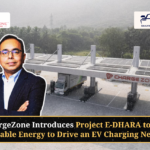RecycleKaro and Bajaj Auto collaborate for EV Battery Recycling
RecycleKaro is a company that makes old electric car batteries new again. It has joined hands with Bajaj Auto, a big company that makes two- and three-wheelers. They will work together to make old batteries new again. RecycleKaro uses a special way to take out the good stuff from the old batteries, like cobalt, lithium, nickel, and manganese. They can get back 95% of these things and use them to make new batteries.
This work is very important for taking care of old batteries and saving resources. The two companies will make new batteries from 500 big trucks of old batteries every year. This big work will make less battery garbage and use resources better, matching the world’s aims and the ideas of a round economy.
This ground-breaking initiative not only addresses the mounting challenge of battery disposal but also underscores the imperative need for sustainable practices in the automotive industry. By partnering with RecycleKaro, Bajaj Auto reaffirms its commitment to environmental stewardship and the responsible management of resources.
RecycleKaro’s Founder and director, Mr. Rajesh Gupta, commented on the partnership, stating, “As the EV market continues to grow rapidly, we are witnessing a significant surge in battery waste, which demands our attention. Leveraging our battery recycling expertise, our commitment is to support Bajaj Auto in their dedication to the circular economy and drive progress in the EV industry. Embracing the circular economy is not just essential; it’s imperative. Through the recycling of these end-of-life batteries, we’re not only reducing waste but also reshaping resource utilization for a sustainable future. This marks a significant stride toward net zero targets.”
RecycleKaro has set up an impressive lithium-ion battery recycling facility near Mumbai, covering a vast 17-acre area. Equipped with cutting-edge technology, including a Solvent extraction system, it ensures efficient and safe processing. Achieving over 90% metal extraction efficiency with purity above 99% from scrap batteries, the plant currently handles 2500 metric tonnes of lithium-ion batteries and 7500 metric tonnes of electronic waste. Plans are underway to expand to 50,000 metric tonnes by 2025.





